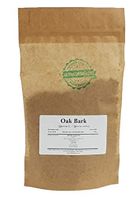Oak Bark
From Wikiwel
Other Names: Chêne Anglais, Chêne Blanc, Chêne Blanc d’Amérique, Chêne Commun, Chêne Pédonculé, Common Oak, Corteza de Roble, Durmast Oak, Écorce de Chêne, Écorce de Chêne Blanc, Eichenrinde, English Oak, Pedunculate Oak, Quercus alba, Quercus Cortex, Quercus pedunculata, Quercus petraea, Quercus robur, Quercus sessiliflora, Sessile Oak, Stave Oak, Stone Oak, Tanner's Bark, Tanner's Oak, White Oak, White Oak Bark.
Oak bark is the bark from several types of oak trees. It is used to make medicine.
Special Precautions of Oak Bark
- Oak bark might be safe for most people when taken for up to 3-4 days for diarrhea. Oak bark can cause serious side effects such as stomach and intestinal problems, and kidney and liver damage.
- Oak bark might be safe for most people when applied directly to the skin for up to 2-3 weeks. When applied to damaged skin or when taken for longer than 2-3 weeks, oak bark is UNSAFE.
- Heart conditions: If you have a heart problem don’t use oak bark.
- Skin conditions including eczema or large areas of skin damage: Don’t take oak bark baths if you have one of these conditions.
- A nerve condition that leads to overly tight muscles (hypertonia): Don’t take oak bark baths if you have this condition.
- Fever or infection: Don’t take oak bark baths if you have one of these conditions.
- Kidney problems: There is concern that using oak bark might make kidney problems worse. Avoid use.
- Liver problems: There is concern that using oak bark might make liver problems worse. Avoid use.
Health Benefits and uses of Oak Bark are
Oak bark contains tannins, which might help treat diarrhea and inflammation.
- Oak bark is used as a tea for diarrhea, colds, fever, cough, and bronchitis; for stimulating appetite; and for improving digestion.
- Some people apply oak bark directly to the skin in a compress or add it to bath water for pain and swelling (inflammation) of the skin, mouth, throat, genitals, and anal region; and for red itchy skin due to cold exposure (chilblains).
- Hemorrhoids : Oak or Quercus spp.has potent astringent, antiseptic and anti-inflammatory actions. Herbalists use the bark to treat hemorrhoids and diarrhea. Active components include ellagitannins, catechins and proanthocyanidins, and you can use the herb internally or externally. Herbalist David Hoffmann advises using a decoction of the bark as an enema for hemorrhoids. Prepare a decoction by boiling one teaspoon of the bark in one cup of water for 15 minutes, cool and use. You can also apply compresses soaked in a cooled decoction externally. Do not use this herb if you have constipation.
